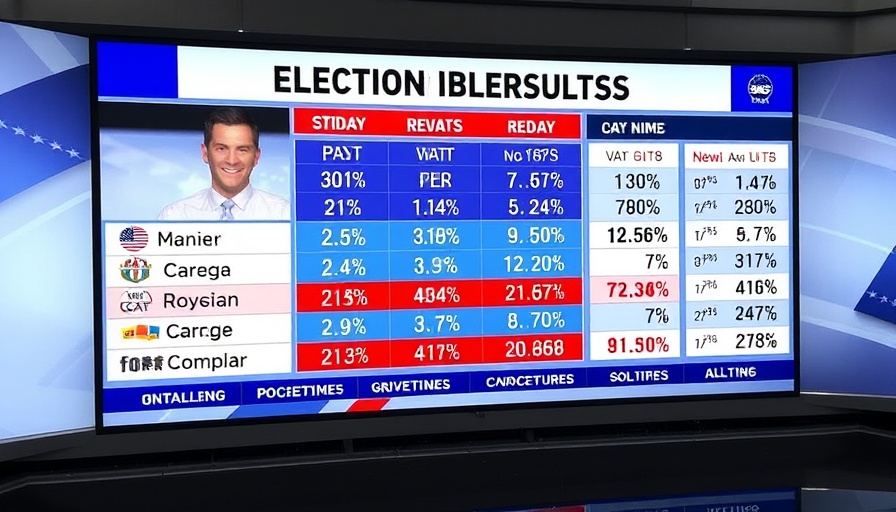
The Future of Detroit's Leadership
The recent Michigan primary election has set the stage for a pivotal contest in the city of Detroit, where diverse voices will vie for leadership in a city characterized by dynamic change and deep-rooted challenges. The primaries revealed a wide array of candidates, but two figures emerged prominently: Mary Sheffield and Pastor Solomon Kinloch Jr., leading the pack with strong, yet contrasting visions for the city's future. This election is significant not only for the participants but for the residents who seek transformative policies that bridge gaps in community services and uplift neighborhoods.
In 'Michigan 2025 Primary Election Results roll in,' we examine the evolving dynamics of Detroit's political landscape and the critical choices facing voters.
Who Advanced? Key Players in the Detroit Mayoral Race
The most notable highlight from the election results was Mary Sheffield’s considerable lead, capturing over 50% of the votes, which positions her as a strong candidate for the upcoming general election. Sheffield’s grassroots approach resonated with constituents who are eager for leadership that prioritizes integrity and accountability. In contrast, Solomon Kinloch Jr., with about 17% of the votes, emphasized a message of inclusion and service, recognizing that while the city experiences urban revival, significant portions of its population still wrestle with economic hardships.
A Tale of Two Cities: Addressing Detroit's Divides
Kinloch articulated a poignant narrative of Detroit as a tale of two cities—one thriving in its urban core and the other struggling in its neighborhoods. His speech at his watch party highlighted the disparity in wealth and safety, noting the troubling juxtaposition of thriving downtown investments against the backdrop of poverty. He appealed for a reconciliation that addresses not just economic but also social inequities, challenging all Detroiters to engage more actively in the rebuilding process.
The Rising Importance of Grassroots Campaigning
As noted during the coverage, Grassroots campaigning played a pivotal role in this election cycle. Saunteel Jenkins, who stood closely behind Kinloch in the preliminary counting, highlighted the importance of connecting directly with voters. Despite lacking the extensive backing of larger political entities, her efforts reinforced the value of community engagement. This approach has become increasingly vital in building trust and encouraging participation among constituents who have often felt disenfranchised by traditional political mechanisms.
Voter Turnout: A Cause for Concern
Despite the charged atmosphere during the elections, reports indicated a disappointing turnout. Many community members cited busyness and disinterest as key reasons for not participating, reflecting a broader apathy that could hinder local governance. For leaders, this is a call to action: bridging the gap between the governance and communities through initiatives that showcase the tangible impact of voting. Educating voters on how their choices directly influence city leadership and policies might galvanize greater turnout in future elections.
Local Policies Impacting Everyday Life
The Detroit mayoral race is more than a political contest; it underscores issues that affect daily life—public safety, housing stability, and local economic conditions. With rising rents and stagnant wages reported, solutions for affordable housing need urgent consideration. Leaders must prioritize accessibility in benefits and services while ensuring that all neighborhoods are considered in developmental plans. Understanding these policies will bring voters closer to their elected officials’ stances and past actions.
Challenges Ahead for Detroit’s Incoming Mayor
Whoever emerges from the primary stands at a crossroads filled with challenges. Sending a compelling message of hope and progress requires not just political prowess, but an understanding of the lived experiences of Detroit's residents. The incoming mayor must unite various factions of the city while addressing pressing local issues—from public safety to infrastructure development. This requires a commitment to transparency and a willingness to engage constituents collaboratively.
Conclusion: A Call to Civic Engagement
The Detroit elections represent much more than a vote; they reflect the hopes and aspirations of its citizens. As we approach the general election, it's critical for residents to remain informed and engaged. Each candidate’s platform presents unique opportunities to shape the future of the city, and voting is the most direct way to voice your perspective. As the city moves forward, every resident's participation matters. It's time to invest in the future of Detroit—not just at the ballot box but in community dialogues, civic engagement, and ongoing discussions about what it means to live in this vibrant yet complex metropolis.
 Add Row
Add Row  Add
Add 



Write A Comment